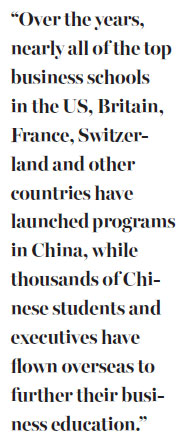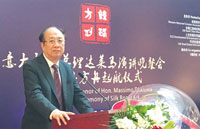Add business to development lessons
Updated: 2016-06-03 08:18
By Fu Jing(China Daily Europe)
|
|||||||||
Leading business schools should take into consideration opportunities in developing countries when designing their strategies
Justin Lin, a former chief economist of the World Bank, acquired a new hat at the end of April when he became the inaugural dean of Peking University's South-South Cooperation and Development Institute.
In September, enrolled students from developing countries will be able to study the experiences and lessons of China's development in recent decades.
Lin, who is passionate about using the country's experiences to spark African economies, says the inauguration is a milestone event, as it will systematically begin the export of China's development and institutional experiences.
In fact, Tsinghua University, just a few blocks away from Peking University, has already started to do this. Headed up by Xue Lan, dean of the School of Public Policy and Management, the college launched a master's in international development several years ago, mainly focusing on offering outstanding students from the developing world an opportunity to explore China's recipes for development.

Aiming to contribute to the development formulas for developing countries, the programs are timely complements to the Belt and Road Initiative, the Asian Infrastructure Investment Bank and the New Development Bank, which has been formed by the BRICS countries: Brazil, Russia, India, China and South Africa.
Such initiatives are also designed to offer support for less-developed countries to bring about their own miracles.
It is also worth mentioning that many high-level officials and academic leaders in China graduated from universities in the United States, Britain, Germany and other Western countries in the 1980s and early 1990s, such as Lin and Xue, as well as the Chinese leadership's chief economic adviser, Liu He, and People's Bank of China Governor Zhou Xiaochuan. They know well how to mix knowledge gained in the West into China's colorful development realities.
So teaching students from developing countries such skills should be at the core of the curriculum in the programs offered by Peking and Tsinghua universities.
However, Lin and Xue are providing only one type of education that China can offer to poorer countries. Another is business management.

Over the years, nearly all of the top business schools in the US, Britain, France, Switzerland and other countries have launched programs in China, while thousands of Chinese students and executives have flown overseas to further their business education. China and the European Union have even jointly launched a business school with branches in Shanghai and Beijing.
Business management schools at Chinese universities have also become more competitive, and some have started to take small steps in enrolling overseas students.
Just as China has shaped a great development legacy on the policy front, Chinese businesspeople have gained tremendous experience in building various-scale business empires from scratch.
In this sense, Peking and Tsinghua universities are just setting an example for how China can pass on its development pattern and the lessons it has learned.
Considering the massive demand for such knowledge from developing countries, the next step may be to develop an independent university for South-South cooperation and international development. With its headquarters in Beijing, it could set up branches in developing countries in Africa and elsewhere.
Leading Chinese business schools should take into consideration the opportunities in developing countries when designing their strategies.
Plus, China has advantages in linking the expertise of the developed world, too. Now, China has proposed third-party cooperation with countries such as Britain, France and Switzerland.
If that concept is used in education, the benefits offered to developing countries will be increased.
The author is deputy editor of China Daily European Weekly.
Contact the writer at fujing@chinadaily.com.cn
Today's Top News
Eyeing the goal in European football
Suddenly, it's a small world
China looking forward to trade talks with EEU: MOC
Russia to promote EAEU-China economic cooperation
AIIB 'set to earn international trust, credibility'
EIB and AIIB to strengthen cooperation
Some 13,000 migrants saved, over 700 dead
Economists urge go-slow on EU's anti-dumping
Hot Topics
Lunar probe , China growth forecasts, Emission rules get tougher, China seen through 'colored lens', International board,
Editor's Picks

|

|

|

|

|

|







